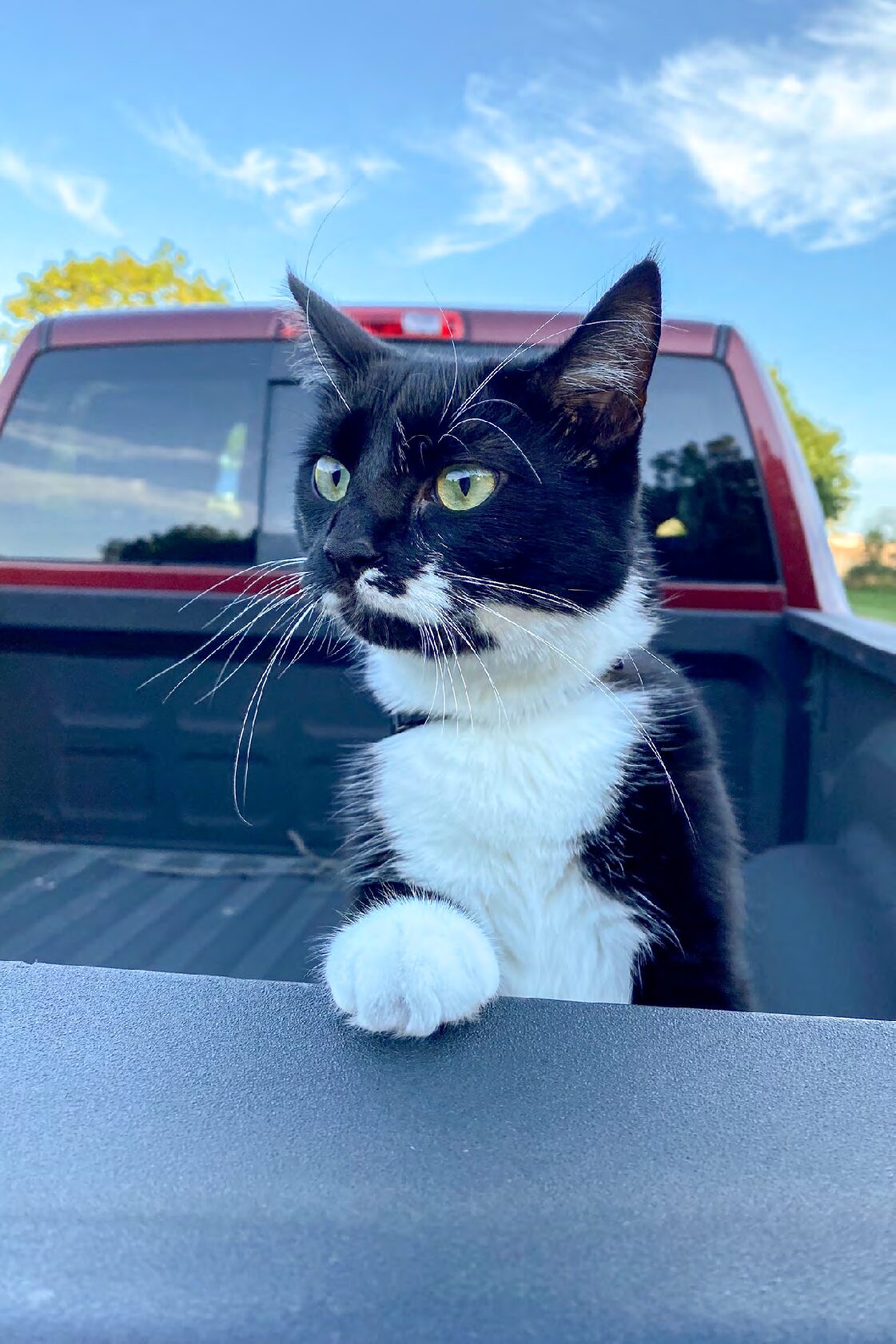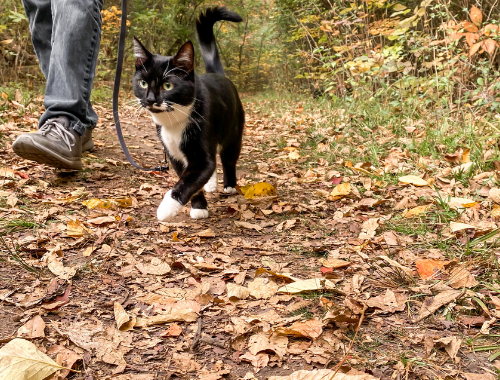
HOW TO DEAL WITH MOTION SICKNESS IN CATS
Having cats with motion sickness is understandably not ideal when needing to travel. Whether it be car rides, in their backpack, a bicycle, or even on a boat, motion sickness can strike at any time and it is not pleasant for your kitty. Motion sickness can occur in any cat, regardless of age, breed, or sex. However, it typically affect kittens and those who may not be used to traveling as much.
What is motion sickness?
There are two main causes of motion sickness in cats. The first one relates to balance. There is a balance system in the inner ear that communicates with their brain. If off balance, due to motion or pressure changes, it can activate their emetic center in their brain (making them vomit) or their GI tract (increasing their motility and causing your cat to need to go to the bathroom). Kittens are actually more prone to motion sickness, as their balance center in their ears are still immature. So, there is a chance that a kitten experiencing motion sickness could outgrow it.
The other common cause of motion sickness is fear, stress, and anxiety. If your cat gets very stressed and scared of the car, boat, bicycle, etc., they can get themselves so worked up that they become nauseous. We have a few tips to try to help your cat feel more comfortable, but these may not work for every cat and some cats may not be able to overcome their motion sickness.
Is motion sickness deadly?
Motion sickness itself is not a fatal condition to your cat, however it can cause added stress and anxiety or lead to problems that may be life threatening.
One problem with motion sickness is that some of the symptoms (the starred ones below) can lead to dehydration. Because of this, be sure that your cat drinks water when you are at your destination. Canned food or squeeze up cat treats are great too, as they have high moisture contents and can also serve as a reward to your cat when the trip is done. If the dehydration is severe, your cat may need to get fluids from a veterinarian to correct this.
- To check their hydration status, try the skin tent test. Pinch a bit of their skin around their shoulder blades and gently pull it up. When you let it go, it should snap right back to normal. If it returns to normal slowly, your cat is dehydrated. Be sure to offer water and high moisture canned food or treats. If skin stays tented up and does not fall back at all, your cat is severely dehydrated and should be taken to a veterinarian immediately.
Another issue with motion sickness is the vomiting. This can cause them to aspirate, meaning that they breathe in the vomit and it goes to their lungs. This can cause serious infection (aspiration pneumonia), which can make your cat very sick. It also can be life threatening and require intensive care.
Symptoms of motion sickness include, but are not limited to:
- Vomiting*
- Excessive drooling/salivation*
- Excessive vocalization
- Panting*
- Restless and inability to get comfortable
- Frequent or unexpected urination and/or bowel movements*
Tips to prevent motion sickness
- Start young
- The younger they are, the easier it will be for them to adjust and get used to it. However, older cats can still love traveling and not get sick!
- Practice with short trips
- Bring your cat for a drive around the block every day or every couple of days so that they get used to quick rides.
- You want to make sure that the vet is not always the end result of a car ride. Your cat can begin to associate the car with a negative experience then.
- Play with your cat before traveling
- This will help tire your cat out, so they may just curl up and sleep for the duration of the trip.
- Make them feel comfortable and familiar
- Bring your cats favorite blanket or toy for them to lay on so that they feel at home and may help calm them down.
- For the car
- Keep it at a good temperature for your cat. If they get too hot, they can get uncomfortable too.
- It is best to also keep the windows rolled up to help limit the amount of noise in the car.
- Some soft, quiet music may help as well. Do not keep the radio volume up too high, as again, too much noise can stress out your cat.
- For a boat
- Bring a backpack along for them to retreat to if they get scared. It can act as their safe place and offer comfort to them. We have an article on how to get your cat to love their backpack if you are interested in using one as a safe spot for them!
- Provide shade if you will be out in the sun to help prevent your cat from overheating. You can bring along an umbrella or portable fan to help keep them cool.
- Withhold food
- Some cats may not get sick unless they have a full stomach. If you know your cat gets sick when traveling if they ate just before, try taking away their food and water about 1-2 hours before you are leaving.
- Calming products
- There are many calming sprays, wipes, and diffusers available to that mimic the pheromones cats release from their glands when they are calm. Pheromones are natural chemicals cats produce and use as a form of communication with other cats.
- One of the biggest names in this field is Feliway. Their spray is very popular, which you can check out on Amazon here, but also have diffusers.
- Another great option is from Travfurler. They offer a spray and wipe bundle kit that you can check out here.
- Take breaks if possible
- For plane or boat rides, this may not be possible. But if you are going on a long trip in the car, be sure to take frequent breaks to let your cat out of their carrier and give them a rest from the moving vehicle.
- Veterinary prescriptions
- Some cats may need the strength of veterinary prescribed medications to help combat motion sickness. You can call your veterinarian for an appointment and they can prescribe anti-nausea medication for your cat before a planned trip.
- Give them some time
- Some cats are very vocal and restless in the beginning but will settle down after some time. Help them to feel comfortable and safe until they have gotten used to it and calm down.
- If they do vomit, drool, pant, etc., try some of the other tips to help them out and talk to your veterinarian about things to help alleviate their stress during travels.
- Avoid any unnecessary trips
- Some cats will never be able to overcome their motion sickness. If this is the case, you want to make sure they travel as little as possible. As much as you would like to bring them with you, it may be in your cat’s best interest to stay behind on some trips.
- You can also look into having a mobile vet come to your home for veterinary appointments, so your cat does not need to travel for that either.
How to combat motion sickness
First, figure out what is causing the motion sickness. Is there a common pattern you see of when they get sick? Is it stress and anxiety, is it from eating before hand, is it just on long rides, is it just certain activities (maybe car sick but fine on boats), or is it every time? Then, try some of our tips to help them out for their issue. Your veterinarian can be a great resource and may have some additional tips for you to try as well! We hope this article was helpful and that your cat starts getting used to and enjoying trips you have planned in the future! Good luck!
As always, please feel free to comment or email us if you have any questions and we will try to help in the best way we can.
Disclaimer: This post is not intended to serve as veterinary advice. We always recommend you call or visit a veterinarian if you have any concerns about your cat’s healt

MEET NUGGET
You May Also Like

Top 8 Things To Know Before Getting A Cat
September 25, 2020
How To Keep Your Cat Safe Outside
February 26, 2021

